[ad_1]

If Japan isn’t already on your travel bucket list, it should be.
Whether you prefer the bright city lights of Tokyo or the blooming, slower-paced life of a countryside village, there’s truly something for everyone in Japan.
And there’s no time like the present to hop on a plane over there, as the country joins the likes of Spain, Portugal, and other European countries in offering ‘digital nomad visas’ for remote workers.
To put it simply, digital nomad visas give people the right to work remotely in a country other than their one of residence.
They usually only last for six months to a year, but it’s a brilliant opportunity to see some of the world without having to worry about financial insecurity.
But while we’re on the subject of finances, you should probably know that there are fairly stringent financial requirements to qualify for the Japanese digital nomad visa.

This is because the Japanese government is asking that applicants earn at least ¥10 million (around £53,485,) per year – and that they have private healthcare.
While Japan has its own public healthcare system, travellers are ineligible for it.
The rules around where you can stay are pretty strict too. Because the visa is only for six months, travellers are prohibited from renting any kind of long-term accomondation.
Still, it’s not all bad news — spouses and children will be able to come with you on your adventure provided that they have private health insurance too.
When it comes down to it, the Japanese digital nomad visa isn’t exactly accessible to to the average person — with the average UK salary being £28,000 — but if you can manage to wangle your way to meeting these requirements, you won’t have to wait too long. Japan’s digital nomad visa is set to launch in March.
So, get your paperwork in order, and you might be living your Japanese dream before you know it.
MORE : Red UK passport holders issued warning ahead of summer holiday travel
MORE : I dreamed of travelling while working remotely — then it became my nightmare
MORE : Looking for a cheap holiday? These are the best (and worst) travel booking sites
[ad_2]
Source link


